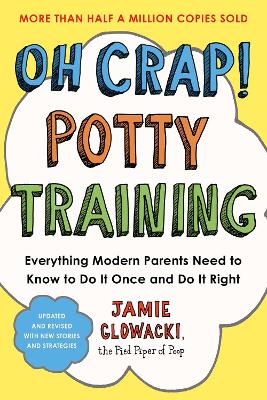Reviewed by ibeforem on
Glowacki suggests that you potty train your child between 20-30 months, and unfortunately I didn’t discover this book until after my son passed through that window. But I picked it up and read it anyway. And, I confess, I had my doubts.
Her method consists of blocks that your child progresses through, and the time your child spends in each block varies wildly. There’s naked time, there are no bribes, there’s no leaving the potty out for months before you start so your child can “get used to it”. There’s no asking if they need to go. There’s a lot of watching your child for cues. There’s “commando” time. Glowacki is funny, but stern in the belief that you should follow her way. And she must know what she’s doing — she does this for a living. The tone of the book can be a bit judgey from time to time, but it’s not a complete turn-off.
Since my son was already older than 30 months (we didn’t start until he turned 3) and had already had some practice with the potty at daycare, I did not intend to follow her plan exactly. In fact, I thought the whole naked time part was pretty stupid. But on the weekend we started, after he had multiple accidents in his pants I decided to give the naked time a try. And you know what? It worked. Within a month, he had gone from naked at home/diapered at daycare to wearing boxer shorts and sweat pants (mimicking “commando” but allowing for underwear at daycare) to wearing underwear all the time (except for sleeping). Within six months, we had ditched the nap and nighttime pull-ups.
Poop was a whole ‘nother story, but that had much more to do with my son than with the potty training methods. And by that point, I trusted Glowacki’s expertise enough to join an online clinic to get personalized assistance.
Is her method perfect? No, but I think there’s a very good foundation there. I found I was able to pick and choose what worked for us. For example, bribes worked for my son, they just did. And it didn’t take long before he stopped asking for his treat after each time he went to the bathroom.
Go into any parenting group or forum and ask for book suggestions about potty training, and this one will be at the top of the list. And for good reason.
Reading updates
- Started reading
- 5 January, 2018: Finished reading
- 5 January, 2018: Reviewed
